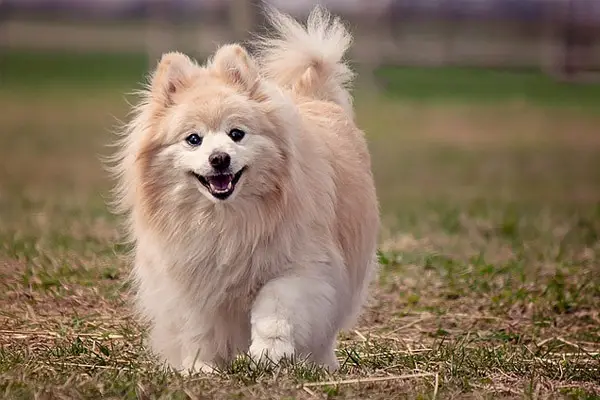Pomeranians are a toy dog breed and the smallest among the Spitz family. The Pomeranian is known to be small but feisty. Some people even regard them as “little dogs who think they can” because of their bold personality.
They are alert and intelligent, which makes them excellent watchdogs despite their size. They will also make great playmates to older children who can differentiate a toy and a dog. They will also make great pets for those who are busy and go out often because they are very independent.

Pomeranian Statistics
| Dog Breed Group | Toy |
| Breed Size | Toy |
| Height | 6-7 inches |
| Weight | 3-7 pounds |
| Lifespan | 12-16 years |
Pomeranian Ratings
| Energy level | |
| Exercise needs | |
| Requires attention | |
| Playfulness | |
| Trainability | |
| Shedding | |
| Grooming | |
| Friendly with family | |
| Friendly with kids | |
| Friendly with strangers | |
| Friendly with other dogs | |
| Prey Drive |
Pomeranian History
Pomeranians originally came from the province of Pomerania, where their name came from. They are said to have descended from the ancient Spitz breed. Added to that, they are close relatives of Norwegian Elkhound, Schipperke, German Spitz, and other Northern dogs.
Early Pomeranians used to weigh 20-30 pounds, and they were already very popular, especially with the nobles. In 1761, the Pomeranians moved to England, and they immediately became famous on royal grounds. However, it was only during the reign of Queen Victoria when the Poms became popular with the public.
Queen Victoria loved the Pomeranians. She had them beside her always and even participated in dog shows. She was also one of the serious breeders of Pomeranians.
When the Queen died, English breeders decided to breed smaller Pomeranians because of the Queen’s love for them. And by 1900, Pomeranians became popular in the US, and they continued to remain one of the most popular dog breeds until today.
During these times, 1900 to 1930s, Pomeranians had the most significant number of entries on dog shows. It was also around this time that the breed was standardized, and the Pomeranians became known as the smallest breed among the Spitz.

Pomeranian Temperament
Pomeranians are extroverts. Despite having a small body, the American Kennel Club still describes them as curious, bold, and lively. They can also be cocky and commanding.
However, even with their bold nature, they are great family pets. He is also a great playmate if you have older children. Just make sure that you keep close supervision to make sure that your toddler won’t do anything that your Pom might get irritated with him.
They also like meeting new people. Though he may approach them cautiously and will stand alert in case he would need to alarm you with something. He also has sharp eyes and loves checking out new sights, sounds, and activity.
Most Pomeranians are also good with other pets in the house. They will be able to play with other dogs, even if males, without any problems. However, they tend to be bossy at times.
You also need to keep a close eye on him because this little dog thinks he is bigger than he is. He may challenge dogs twice his size, and he’s not afraid of that. So, you must watch him.
Just like any other dog breeds, Pomeranians need early socialization and training to maintain his positive temperaments. Allow him to meet strangers and new pets during your walks.
When training him, don’t allow him to boss you around. They may sometimes come off as stubborn, so be sure to be patient and show him that you’re the boss. Try to control excessive barking too. Dog treats can be your weapon at this period.
Pomeranian Care Requirements
- Nutrition: It’s essential always to provide your Pom with a well-balanced and high-quality meal. If you’re opting for commercial products, make sure that it only contains high-quality ingredients. You should also avoid fillers and byproducts that might cause him harm. If you’re serving him a home cooked meal or a raw food diet, then high-quality ingredients are essential too. It should make up at least 40% of protein to ensure that your Pom gets the highest amount of energy. You can also mix in some vegetables and fruits. Since they are highly energetic, they might require 2 cups of food a day as puppies, and as adults, it would vary depending on the amount of activity he does. You should also watch out for his feeding habits and make sure he’s not overfed. It’s also advisable to divide their food intake to 4 to 5 times a day as they have a high metabolism rate.
- Grooming: Pomeranians are also known for their fluffy coat, a profuse double coat, which sheds seasonally. However, even if that’s the case, frequent brushing is still needed to maintain its healthy growth. Brush their hair at least once a week to avoid mats. Don’t forget to trim their nails. Since they are highly active, their nails should be kept short to avoid any pain on your dog’s part. You can also take your Pom to a dog groomer so he can trim the coat too if it’s too long. Plus, you can include a bath already. This way, your Pom is given his complete overall Royal groom. This will be something that you can do every 4 to 6 weeks or depend on your needs.
- Exercise: Although they wouldn’t complain about lazing around all day, Pomeranians still love a little activity or play within the day. You can even just do a daily walk if you don’t want high-intensive activities like running. Just make sure to keep a close watch on him as he tends to escape, even in fenced areas, if the fences are too short. It’s even better if you can keep them on a leash. They can also become a target of larger animals because of their size, so be sure to keep them supervised.
- Health: Pomeranians live a long life, and they are generally healthy. However, they are still prone to several diseases that you should be aware of before you own one. One of the most common health issues is obesity. It’s easy to overfeed a Pomeranian, which is why you need to watch their calorie intake. They can also experience teeth and gum problems because of their small mouth, which can cause overcrowding of teeth. More serious conditions that you can take note of are hypoglycemia, coat loss, cataracts, luxating patella, and tracheal collapse. Screening tests can be done for early detection. You also need to keep a close watch on them and take them for regular check-ups to ensure optimal health.
- Lifespan: The life expectancy of Pomeranians is 12-16 years.

Famous Pomeranians
- Marco, Gina, and Turi: Pomeranian dogs of Queen Victoria
- Mercury and Phoebe: Pomeranian dogs of Queen Charlotte, wife of George III of England
- Jiff: A Pomeranian who starred in a movie named Adventure of Bailey; Gained a Guinness Book of World Record as the “Fastest Dog on Two Paws”
- Sashi: A Pomeranian cast on the movie Chasing Papi
- Foxxy: Pomeranian of Nichole Richie
- Kimchi: Paris Hilton’s Pomeranian
- Boo: An internet-famous Pomeranian; He is known as the world’s cutest dog
- Lady: One of the survivor Pomeranians from the Titanic
- Glen Rose Flashaway: The first Pomeranian winner of the Toy Group at Westminster Kennel Club Dog Show
- Great Elms Prince Charming II: The first Pomeranian to win the Best in Show at Westminster Kennel Club
Fun Facts About Pomeranians
- Pomeranians used to weigh 20 to 30 pounds and were used as sled dogs.
- They’re not the only species with this name. There is a Pomeranian Coarsewool Sheep, Pomeranian Duck, and Pomeranian Goose.
- They are believed to be closely related to sled dogs and wolves.
- The Pomeranian’s name came from the region Pomerania where they were bred.
- Royals love them, especially Queen Victoria.
- They are loved by famous artists such as Mozart, Chopin, and Michelangelo.
- They have warm and fluffy coats.
- Pomeranians are survivors; two Pomeranians survived from the sinking Titanic.
- They are known to produce small litters.
Check Out Other Toy Dog Breeds:
Affenpinscher, Brussels Griffon, Cavalier King Charles Spaniel, Chihuahua, Chinese Crested, English Toy Spaniel, Havanese, Italian Greyhound, Japanese Chin, Maltese, Miniature Pinscher, Papillon, Pekingese, Pug, Shih Tzu, Silky Terrier, Toy Fox Terrier, Yorkshire Terrier
